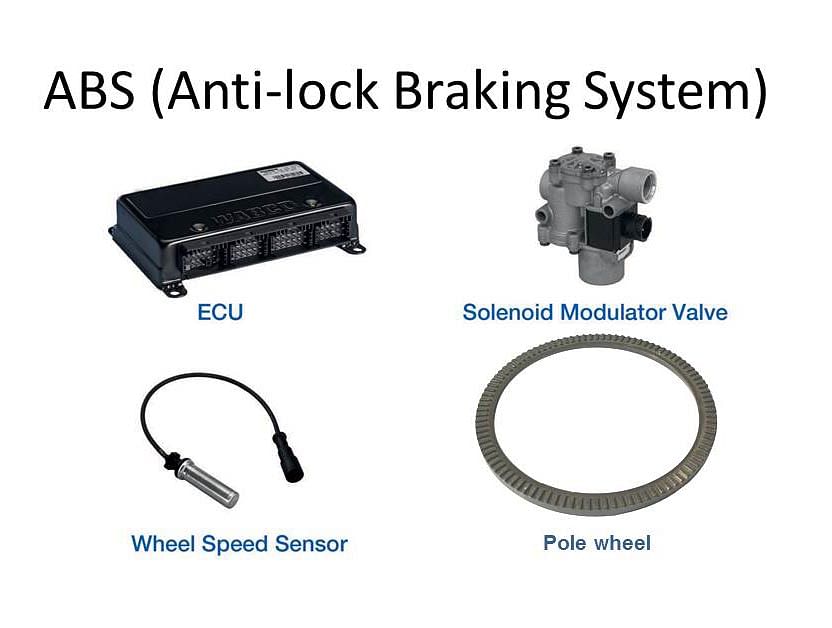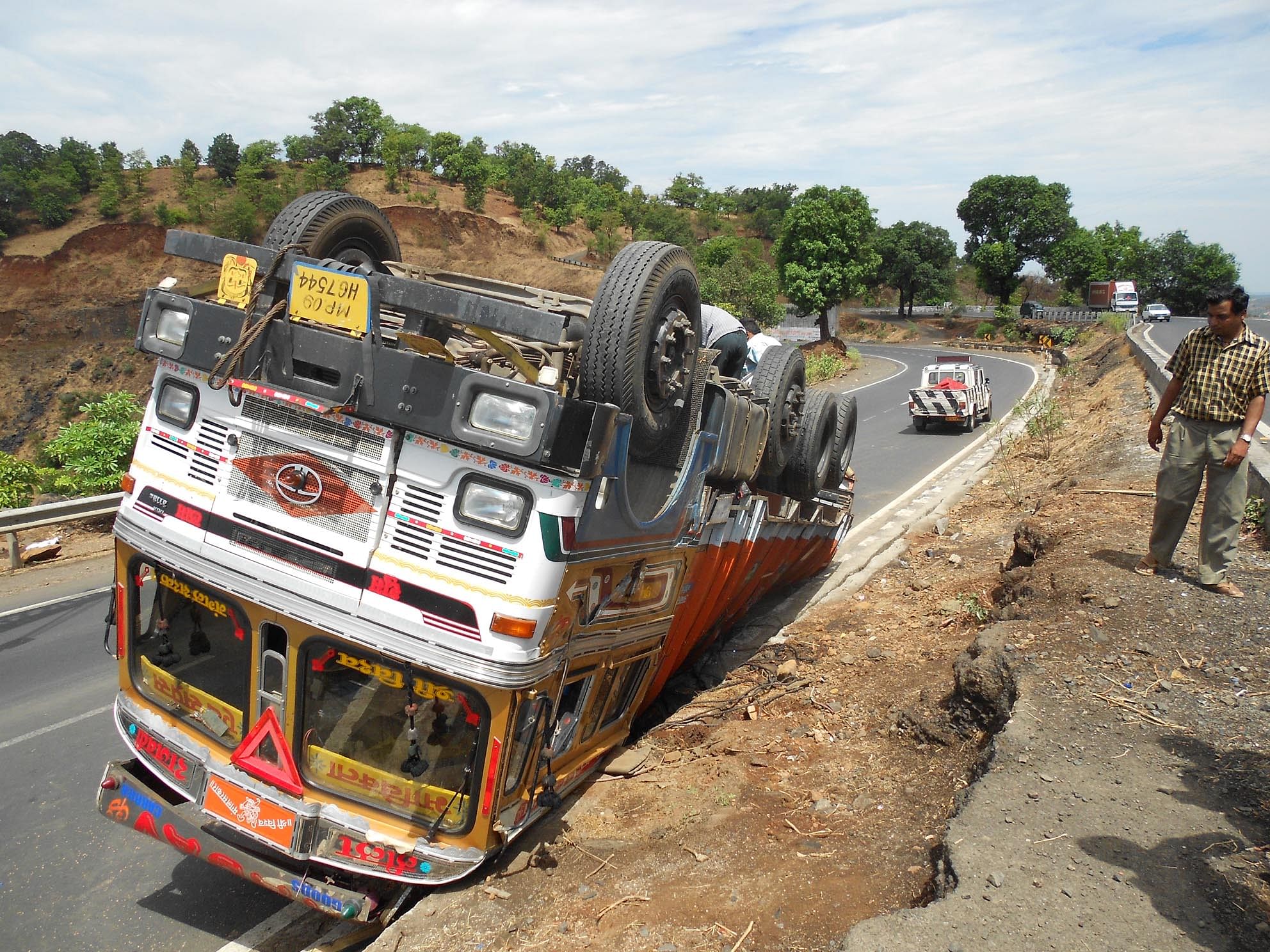Mandatory ABS for Commercial Vehicles in India from midnight
The first day of the new fiscal year (2015-16) tomorrow will also herald an important step towards increasing road safety on Indian roads. And it couldn’t have come sooner.
The first day of the new fiscal year (2015-16) tomorrow will also herald an important step towards increasing road safety on Indian roads. And it couldn’t have come sooner.
Effective midnight of April 1, 2015, the Ministry of Road Transport and Highway (MoRTH) has made the anti-lock braking system (ABS) mandatory for commercial vehicles (CVs). Initially, all new trucks launched in the N3 category (above 12 tonnes Gross Vehicle Weight) and buses in the M3 category (above 5 tonnes GVW and carrying nine passengers) will have to be compulsorily fitted with ABS at the time of manufacturing. It will not available as a retrofitment for existing vehicles.
KK Gandhi, executive director (technical) of apex industry body Society of Indian Automobile Manufacturers (SIAM), who has been closely associated with the issue, told Autocar Professionalthat earlier tractors of tractor-trailers, multi-axle and high-end vehicles as well as all India tourist buses were mandatorily fitted with ABS. Now the notification coming under the ambit of the Central Motor Vehicle Rules of the Ministry of Road Transport and Highways has been extended to the heavy range of commercial vehicles as well.

ABS fitment in CVs in India kicked off in October 2006 when government authorities notified it for the N2 and N3 category of vehicles carrying goods of a hazardous nature as well as LPG in the 3.5 tonnes and above gross weight category. On 1 October 2007, another announcement made it mandatory for all smaller-size M2 buses plying on hilly terrain as well as all tourist buses (M3) double-decker transport buses (N3) and for the tractors of tractor-trailers.
“ABS will be especially beneficial on different types of surfaces where commercial vehicles are prone to skid or the wheel likely to lock. ABS is an emergency braking system that will prevent the wheels from locking,” added Gandhi.
ABS technology is well proven globally. It is an advanced braking mechanism which prevents wheel locking and skidding of the vehicle during sudden braking and in slippery road conditions, thereby preventing accidents. ABS enhances vehicle steerability while braking, reduces the stopping distance, and ensures controlled stopping. Briefly put, it helps the driver to bring the vehicle under control under emergency braking.
The new norms will bring a wide range of CVs under the mandatory ABS fitment ambit. Till now, ABS is mandatory only for vehicles carrying petroleum and explosive items. Since 2006, ABS has been obligatory for 40- and 49-tonne tractor-trailers.
Though most OEMs in India offer trucks and buses fitted with ABS but since the system fitment is not mandatory and optional, a good number of fleet operators and truck buyers shy away from having ABS, citing increased costs.
The government notification on ABS fitment for CVs spells good news for component suppliers – and road safety. Prominent producers of ABS kits for CVs in India are Wabco and Knorr-Bremse.
Wabco is gearing up to augment its manufacturing capacity. It is setting up a dedicated assembly line at its Chennai plant to make ABS kits, both for OEs and the aftermarket.
Welcoming the government’s decision to implement mandatory ABS fitment on CVs, P Kaniappan, managing director, Wabco India, said that as per data available around 30 percent road accidents in India are caused by CVs and vehicles equipped with ABS will help bring down the accident rates. He said this issue has been widely discussed within the CMVR forum with representatives from OEMs, component suppliers and industry bodies SIAM and ACMA. The government has notified the ABS regulation only after considering their point of view.
In a recent interview Jacques Esculier, Wabco’s global chairman and CEO, told Autocar Professional that “India is a major cornerstone to enhance road safety. Statistically, India apparently has one percent of the fleet of trucks and buses in the world but has 8 percent of fatalities that involve trucks and government is keen to address this issue.”
He said, “ABS not only provides a safety environment on the truck that is very basic and fundamental but opens the door to the suite of technologies that we have developed in Europe”.
He pointed out that Brazil took the decision to implement ABS two years ago and now China is actually increasing the mandate for ABS from a third of its fleet to three-quarters.
ABS fitment will initially drive up the cost of a CV between Rs 15,000-20,000 per unit, depending upon the vehicle configuration. However, the cost will gradually come down once economies of scale are achieved.
If one goes by SIAM’s domestic production figures, over 21,000 vehicles in the N3 and M3 categories rolled out in February 2015. This means around 250,000 CVs in these two categories will see ABS going on them per annum, excluding the 40- and 49-tonners which anyway have ABS as standard.
This will translate into good business for CV ABS kit suppliers like Wabco and Knorr-Bremse. Demand for such kits will further grow when ABS fitment will become mandatory for all commercial vehicles starting October this year.
ABS = reduced accidents, lives saved
The installation of ABS is expected to lower India’s notoriously high road accident and causality rate that is among the world’s highest. Reports suggest that 78 percent of accidents in India are due to bad driving and of the total number of accidents recorded, trucks and buses account over 32 percent.

According to a Ministry of Home Affairs report, in 2012, there were 139,091 fatalities due to 4,73,416 road accidents in India. Trucks and ‘lorries’ accounted for 19.2 percent (26,678 people) and buses for 9.4 percent (13,076 people). Fatalities due to truck accidents were the highest in Uttar Pradesh (13.4%), Andhra Pradesh (12.9%) and Tamil Nadu (11.3%). Bus accidents accounted for 16.8% victims in Tamil Nadu, followed by Uttar Pradesh (13.6%) and Andhra Pradesh (10.5%).
While mandatory fitment of ABS on the N3 and M3 range of CVs is a first step in the right direction, it will also lead to the safety kit filtering down to CVs in other categories. It is understood that global supplier Bosch has sought to focus on ABS for smaller vehicles which are M1 (passenger cars), N1 (pickups below 3.5 tonne GVW), N2 (3.5-12 tonne GVW) and M2 categories that are equipped with hydraulic brakes.
Most of these vehicles currently use pneumatic brake systems and ABS will also be compatible with pneumatic ABS. Pneumatic ABS involves the use of high-pressure air for braking and is suited for M&HCVs while at the lower end – in the sub-5 tonne – gross vehicle weight category and for cars, hydraulic brakes are more preferable. But hydraulic brakes require hydraulic oil and a larger number of components that makes them more expensive.
RELATED ARTICLES
Cosmo First diversifies into paint protection film and ceramic coatings
The Aurangabad, Maharashtra-based packaging materials supplier is leveraging its competencies in plastic films and speci...
JSW MG Motor India confident of selling 1,000 M9 electric MPVs in first year
The 5.2-metre-long, seven-seater luxury electric MPV, which will be locally assembled at the Halol plant in Gujarat, wil...
Modern Automotives targets 25% CAGR in forged components by FY2031, diversifies into e-3Ws
The Tier-1 component supplier of forged components such as connecting rods, crankshafts, tie-rods, and fork bridges to l...






 31 Mar 2015
31 Mar 2015
 79574 Views
79574 Views





 Autocar Professional Bureau
Autocar Professional Bureau




